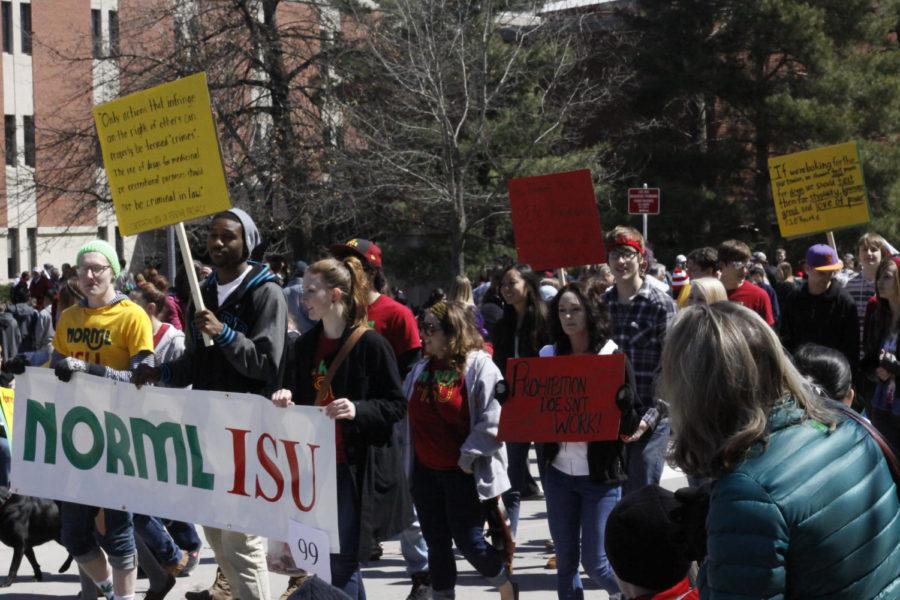Sinclair: Significant profits, increased safety await marijuana legalization
Photo: Brandi Boyett/Iowa State
Students of the ISU Chapter of the National Organization for the Reform of Marijuana Laws march at the Veishea parade on April 20, 2013.
January 26, 2017
I do not advocate the use of marijuana, nor do I judge anyone for using marijuana. Smoking marijuana is someone’s choice, and although I do not personally smoke it, that does not mean I am against it. On the contrary, I am in favor of legalizing marijuana.
Marijuana has already been legalized in a few select states, including Colorado and Washington, and has enormous support across the country. According to a 2016 Gallup poll, 60 percent of Americans support the legalization of marijuana.
Beyond just popular support, there are numerous benefits to legalizing marijuana. The legalization of marijuana would provide millions, if not billions, of dollars in revenue, protect users by making the drug safer and reduce prison overcrowding.
In terms of economic benefits of marijuana becoming legal, enormous profits await the people and the government. Once legalized, marijuana can be taxed just like tobacco and alcohol. It’s estimated that the marijuana industry could “generate up to $28 billion in tax revenues,” an additional income that the government should happily welcome. This industry also would encourage the creation of small businesses and would thrive in communities across the country.
If this estimate is not convincing enough, look at the amount of money made in states that have already legalized marijuana. Colorado was expected to make about $70 million in marijuana tax revenue per year. In 2016, it had collected more than $150 million in taxes from legal marijuana sales by the end of October, according to Fortune.
Washington has had similar success. The state is averaging $2 million a day and has the potential to reach $270 million a year, according to Tax Foundation.
In addition to making money, the United States will also save money by legalizing marijuana. Removing marijuana from the Schedule I category and making it available for recreational use would result in a monumental drop in the amount of arrests for the possession of marijuana.
Prisons in the United States are overcrowded. About 2.3 million people are incarcerated, according to Prison Policy Initiative, and 1 in 5 people in prison are locked up for a drug offense.
Most are there for the possession of drugs, as there are four times as many arrests for drug possession than drug sales.
Marijuana is the most commonly-used illicit drug in the country. Decriminalizing it would thin out prison populations and save taxpayers thousands of dollars. It would also allow police officers to focus on more violent and dangerous criminal activity.
Legalization also would keep more Americans safe. There are currenlty no regulations on the production of marijuana, which means anything could be included in it.
Consumers have no way of knowing what environment it was made in and how it was made. Legalizing it would enforce safety standards and an ingredient list for anything legally sold. This would eliminate the risk of someone smoking an unknown substance in the product.
Marijuana is a controversial issue. There are certainly health concerns that come with marijuana use. Short-term effects include an altered sense of time, mood changes, impaired memory and altered senses. Long-terms effects include brain development issues, if used as a teenager. But perhaps the most significant health concern is that marijuana is an addictive substance.
While these are all valid concerns, marijuana is not vastly different than alcohol and tobacco. All of these substances are addictive and have their own set of health concerns.
Alcohol causes an estimated 88,000 deaths annually in the United States, according to the National Institute on Alcohol Abuse and Alcoholism. Cigarette smoking causes more than 480,000 deaths annually, and tobacco use is the leading preventable cause of death in the country, according to the Centers for Disease Control and Prevention.
Marijuana, on the other hand, seems almost harmless compared to these two substances, considering you cannot overdose on marijuana. There is also very little evidence of deaths directly related to using marijuana. And yet for some reason, marijuana has been shunned from society while tobacco and alcohol have been embraced.
Legalizing marijuana isn’t a hard decision. By controlling the substance and making sure it’s correctly handled, illegal marijuana can become a thing of the past.
A clear set of rules and procedures to producing and selling marijuana will benefit everyone. Jails will become less crowded, marijuana will become a safer product and the economy across the nation will get a boost. This issue won’t be solved overnight, but I hope America will soon see the benefits of legalizing marijuana.







